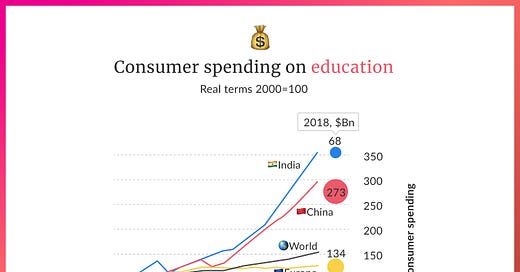One Step Up Issue #11
This week we look at EdTech in India, Shopify's unique org culture, Costco' genius, TikTok, Amazon and anti-trust, why our greatest inventors appear as hucksters, investor psychology + more
Is EdTech India’s Next Global Export?
EdTech in India has come a long way. This article highlights the history (highlighting pivotal moments that helped shape the narrative around ed tech), present and what the future holds for the market.

Accelerated Learning: Learn Faster and Remember More
One reason why we’re bad at learning is that we bring a lot of baggage to it—baggage we often pick up early in life and then struggle to let go of later. If you can let go of assumptions about what you should do, you can learn much more effectively. One major piece of baggage we accrue is the belief that if we’re not visibly active, we’re not learning. This is incorrect. Learning requires time to reflect. It requires discussing what you’ve learned and letting your mind wander. You need to let go of trying to look smart, and focus instead on trying to be smart.
Great interview of Adrian Cho (Former Head of Getting Shit Done at Shopify - you read that right) on how Shopify achieved scale, the culture that defines the organisation and parallels between fostering creativity in jazz versus business (Adrian is also a musician who has been performing for over forty years, he is best known as the Artistic Director of the Ottawa Jazz Orchestra, a unique, critically acclaimed symphonic jazz ensemble he founded in 2006).
How Costco Convinces Brands to Cannibalize Themselves
Stunning article on Costco’s power in their industry when it comes to Kirkland - their private label business.
Costco gets the best manufacturers in the world — who already have products on Costco shelves — to make Kirkland products. While customers might not know it, Kirkland products are often made by the same manufacturers who make the branded products that sit next to them on the shelves.
And not only that, but according to a Reddit user who worked at a Costco supplier, Kirkland products have to be at least 1% better than the equivalent branded products (on some metric of their choosing). Costco forces manufacturers to compete with a better version of themselves.
As a supplier, you jump on it, because the data is clear that it jacks your sales. Usually your product sits right next to theirs on the shelf. So the consumer has 2 choices. Yours, or yours (at slightly worse margin).
Video in link above.
Article in link above; thread below
Amazon, Antitrust, and Private Label Goods
In the debate over private label goods, it’s important to keep in mind why consumers prefer them. According to survey data from Nielsen, 70% of people say they purchase private label brands to save money. This is unsurprising as private label goods tend to be less expensive than name brand goods while offering similar levels of quality. It’s as clear an example there is of direct horizontal competition.

Why our greatest inventors are supreme hucksters
The importance of generating hype alongside meaningful improvements may explain why many of our greatest inventors— Steve Jobs, Elon Musk and Thomas Alva — are supreme hucksters. The ability to create the hype alongside the invention may be decisive. Perhaps that was Nikola Tesla’s failing?
Also: from Bethany McLean’s podcast with Shane Parrish at Farnam Street.
The true contradiction is to be long equities without being long humanity. It’s hard to sensibly invest for retirement on the back of a doomed worldview or country-view. It badly messes up minds.
As an investor, I balance being macro optimistic and micro skeptical.Highlights from Poor Charlie’s Almanack
Not that I’d ever recommend anyone not reading the book, but if you want to keep a handy cliff-notes version of key highlights from this book - this is the link to bookmark and revist.
Till next time.
Desire is suffering. A moving target.










